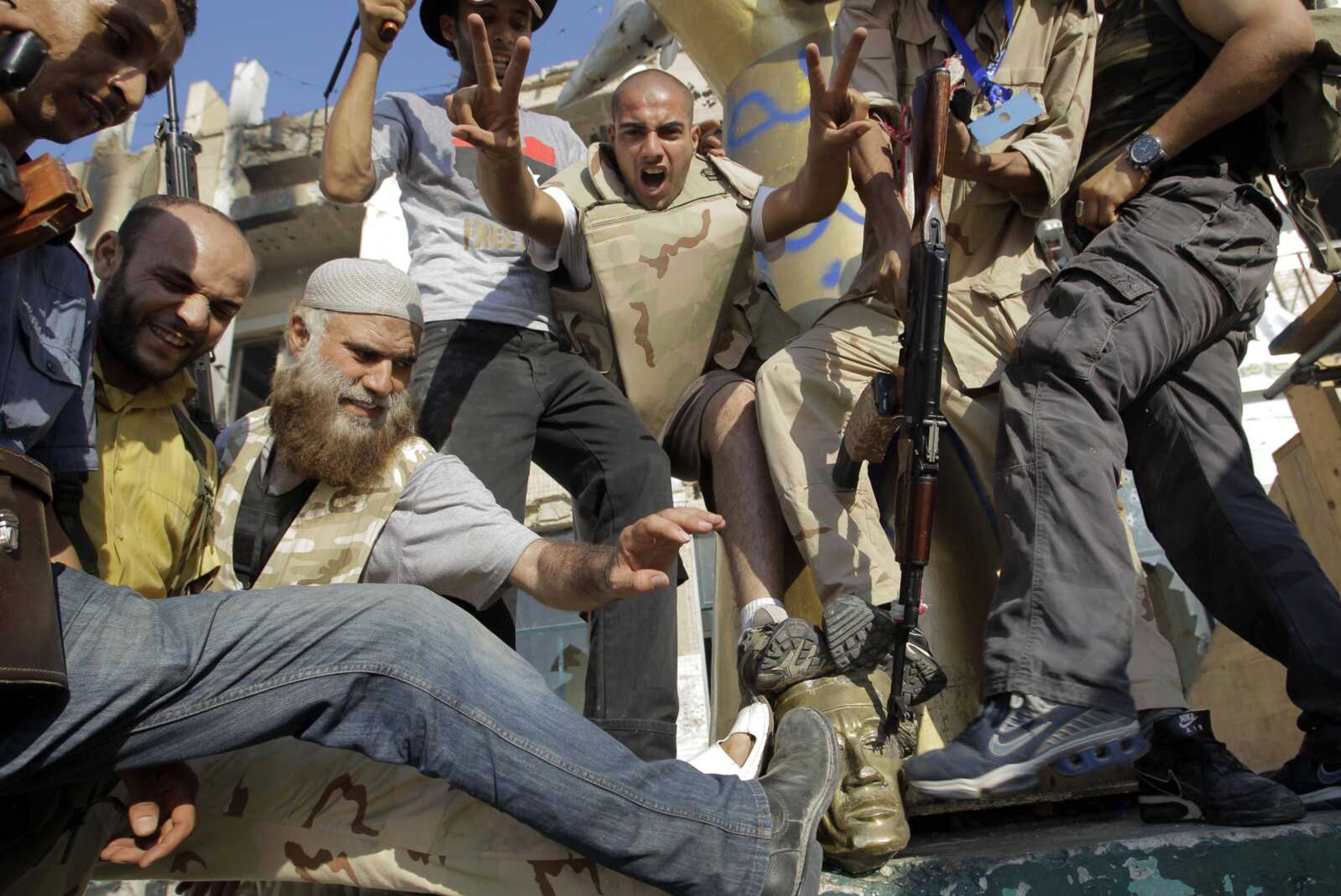Libyan rebels storm seat of Gadhafi's power
Hundreds of Libyan rebels stormed Moammar Gadhafi's compound Tuesday, charging wildly through the symbolic heart of the crumbling regime as they killed loyalist troops, looted armories and knocked the head off a statue of the besieged dictator. But they found no sign of the man himself...
Hundreds of Libyan rebels stormed Moammar Gadhafi's compound Tuesday, charging wildly through the symbolic heart of the crumbling regime as they killed loyalist troops, looted armories and knocked the head off a statue of the besieged dictator. But they found no sign of the man himself.
The storming of Bab al-Aziziya, long the nexus of Gadhafi's power, marked the effective collapse of his 42-year-old regime. But with Gadhafi and his powerful sons still unaccounted for -- and gunbattles flaring across the nervous city -- the fighters cannot declare victory.
Hours after the battle erupted, a pro-Gadhafi TV channel quoted the Libyan leader as saying he retreated from his Tripoli compound in a "tactical move" after 64 NATO airstrikes turned it to rubble. Al-Rai TV said Wednesday local time it would air the comments in full and reported an excerpt in which Gadhafi vowed his forces would resist "the aggression with all strength" until either victory or death.
His government's chief spokesman also managed to get word out in a phone interview with the same station, promising "we will be back to take Tripoli back."
The rebel force entered the compound after fighting for five hours with Gadhafi loyalists outside, using mortars, heavy machine guns and anti-aircraft guns. They killed some of those who defended the compound and hauled off thousands of rifles, crates of weapons and trucks with guns mounted on the back in a frenzy of looting.
Tripoli's new rebel military chief, Abdel-Hakim Belhaj, said at nightfall that a small area of the vast compound was still under the control of regime fighters and heavy shooting was heard across Tripoli toward midnight.
The atmosphere in the compound was a mix of joyful celebration and tension. The air was thick with smoke from the battles, and the boom of mortars and the crackle of gunfire was constant. Rebels chanted "Allahu akbar" or "God is great" and on loudspeakers they cried: "Al-Hamdullilah," or "Thank God."
Tumultuous days
The storming of the compound was a new high for the rebels in what has been an emotional roller coaster since they moved into Tripoli on Sunday night. It began with euphoria and claims that they had taken over most of the city with little resistance. The first night they partied in Green Square, a major symbol of the regime where Gadhafi supporters had held almost nightly rallies throughout the uprising. And it seemed Gadhafi rule was teetering on the brink of collapse.
In the early morning hours of Tuesday, there was a shocking setback. The rebels had claimed that they arrested Gadhafi's son and heir apparent, Seif al-Islam. It was confirmed by the International Criminal Court in the Netherlands, which has charged him and his father with crimes against humanity.
But Seif al-Islam showed up at the hotel where foreign journalists are staying under the close watch of regime minders in the early morning hours of Tuesday. He took reporters on a drive in the middle of the night to see hundreds of pro-regime gunmen around Bab al-Aziziya and at least a hundred more lined up outside, where guns were being handed out to volunteers.
The rebels waited hours to explain, saying word of his capture had come from secondhand reports from some rebels that were never confirmed and had been leaked to journalists.
But in an indication that the announcement of his arrest might have been a ruse calculated to demoralize the regime, Mahmoud Jibril, head of the rebels' acting Cabinet, said the reports had some political and military benefits.
"About 30 officers and soldiers surrendered when they heard the news, which helped us take over Bab al-Aziziya swiftly," he said. "And 11 countries recognized the (rebels') National Transitional Council after receiving news of his arrest."
By Tuesday morning, it looked like the capital might descend into bloody urban warfare. There was sporadic gunfire in many parts. The rebels were in control of parts of the city, though it was not clear how extensive their control really was. Then the fighting took focus around Gadhafi's compound.
Rebels were trying to establish civilian control in the chaotic city, even while fire fights continued.
In a deserted five-star hotel on the city's beachfront, a group of rebel leaders who had operated underground for the past six months announced that they had formed a 24-member city council and would now be in charge.
Deputy council chief Usama el-Abed el-Abed called on city workers to return their jobs so life could begin to return to normal. However, the founding members had not invited guests, saying the city was still too dangerous for large gatherings.
Kirsan Ilyumzhinov, the Russian head of the World Chess Federation who has known Gadhafi for years, said he spoke Tuesday by telephone with Gadhafi, who told him he was "alive and well and still in Tripoli." The report could not be independently confirmed.
In other parts of the capital, the rebels said they were also in control of state television. They raised their tricolor flag on the top of the building. Rebels claimed they also control the airport.
After the fall of Bab al-Aziziya, government forces were still holding out at the nearby Rixos hotel where dozens of international journalists were being prevented from leaving by armed government enforcers.
Connect with the Southeast Missourian Newsroom:
For corrections to this story or other insights for the editor, click here. To submit a letter to the editor, click here. To learn about the Southeast Missourian’s AI Policy, click here.









